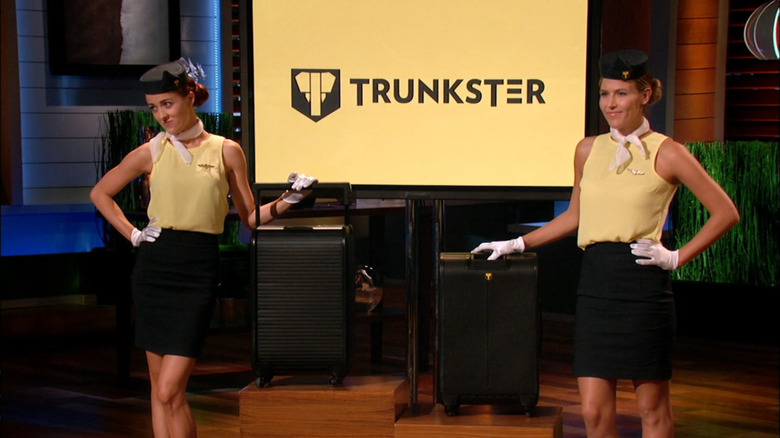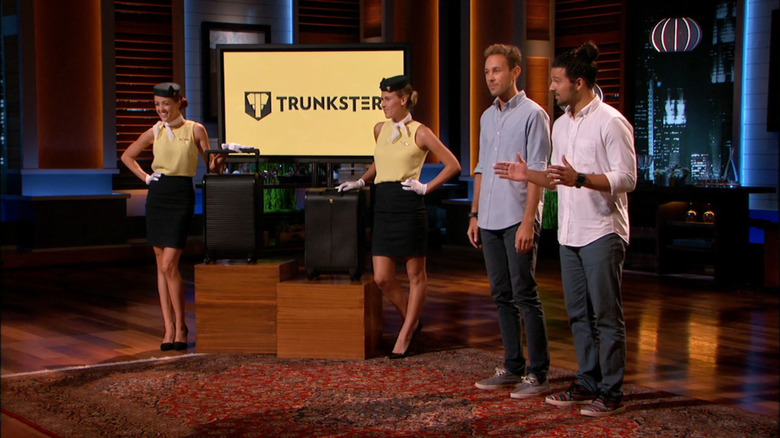What Happened To Trunkster From Shark Tank Season 7?
We may receive a commission on purchases made from links.
For many, a vacation is a time to sit back, unwind, and relax. That being said, as much as people like to visit beautiful locales when they've got the time off, the actual act of traveling isn't so fun, especially with a lot of bulky luggage. The co-founders of the luggage startup called "Trunkster" hoped to change this with an innovative new smart suitcase that would make traveling with all your gear and gadgets less annoying and cumbersome.
Jesse Potash and Gaston Blanchet, co-founders of the luggage startup, appeared on "Shark Tank" Season 7, Episode 10 and hoped to raise more money to fulfill purchase orders they received from successful crowdfunding campaigns. With flashy marketing and a pretty solid pitch, the duo was able to wrangle a few offers, but that isn't the whole picture. While at face value, Trunkster seemed to be an innovator looking to disrupt the market, there was much more behind the scenes that would later be revealed after the episode.
What happened to Trunkster on Shark Tank?
Potash and Blanchet sought a $1.4 million investment for 5% of the company, bringing the total valuation for Trunkster to $28 million. Hoping to improve on the tried-and-true design of modern luggage, the duo set out to disrupt the industry.
At first glance, it seemed like they may have been onto something. With innovations like a zipperless roll-top door, USB charging ports, and what the duo described as the world's first self-contained handle scale, it looked like the invention did deliver much of what typical luggage couldn't.
However, issues started to arise when the sharks dug deeper and inquired about the company's $28 million valuation. Shockingly, Potash and Blanchet admitted that they hadn't shipped a single unit, and most of the company's value had been derived from presales via a Kickstarter campaign, along with highly-aggressive revenue projections for the future.
While the sharks scoffed at the valuation at first, the duo was able to eventually get an investment from Mark Cuban and Lori Greiner with caveats. Greiner and Cuban accepted a 5% stake in Trunkster for the $1.4 million but with a built-in 24-month guarantee that the investors would see that money back or their equity would double. The deal also included royalties on units sold to reduce risk. While the segment ends with everyone shaking hands, there is more to the story than the episode would indicate.
Trunkster struggled after Shark Tank
Before looking at what happened to the company after its "Shark Tank" appearance, it's important to take a look back at the original funding sources for the luggage company before the co-founders appeared on the show. Trunkster started in 2014, just a year before the company's appearance on "Shark Tank." Originally, the duo launched highly successful funding campaigns on Indiegogo and Kickstarter.
The Indiegogo campaign managed to raise $1.5 million, while the Kickstarter raised $1.39 million. This was largely fueled by preorder demand from the backers, hoping to get the luggage once manufacturing was complete. Sadly, visiting these pages today shows a litany of comments from angry backers. Many of these supporters were let down, as their preorders allegedly never arrived or they did arrive but at a lower quality than they were expecting. While it does seem like the company was able to fulfill some orders, the vast majority of comments are negative, and the company never got off the ground to sell directly to consumers as they'd hoped.
Since the episode aired, there's been no confirmation from either Mark Cuban and Lori Greiner on the deal being finalized, though it's widely speculated that the deal was never officially closed.
Is Trunkster still in business?
Today, Trunkster is no longer in existence, and functionality has been disabled on a defunct Trunkster website. There has been seemingly no correspondence between backers of the project and the co-founders since 2017-2018.
Both Jesse Potash and Gaston Blanchet seemed to have moved on in their careers, and they're now working in other industries outside of luggage and travel. While the lead-up to the "Shark Tank" episode saw the company striving for viral exposure, both co-founders have remained out of public view in the years after the episode.
It seems that before a quick transition to a language-learning app, Blanchet founded a company called Storypod, a learning tool for children. Potash works in operations for a company named Bungalow. Sadly, consumers who wanted the tech-forward smart bag will have to explore other options on the market — and backers of the original project, who allegedly never received their preorder, may never actually get it.
"Shark Tank" is available to purchase on Prime Video.



